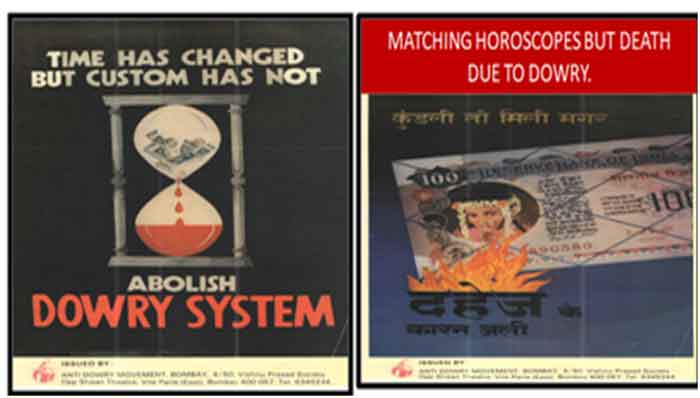
As the author penned down his thoughts on a very recent case of death on account of severe domestic violence of a twenty-three years old girl who was newly married and was carrying a baby of five and half years months in her womb at Sarulah village, Sualkuchi in rural Assam on 16 November, 2020, a peripheral location from the mainland India, all of a sudden the plot of the Indian Bollywood movie ‘Thappad’ (a slap) caught the attention. The movie was set on life of an urban based sound and aware women who is determined not to compromised on any sort of violence against her, even it is a single slap (which is perceived to be normal realities in women lives) by her husband which depicts the importance of women awareness about her dignity and self-esteem in their private lives. This movie stands to be an inspiration of many such women who dare to speak and act but on the other hand in reality, the ground level environment is different. There are women who are ready to bear mental and physical assaults on them in order to preserve the status of their families from being thrashed by the outside world, there are also others who after being at the receiving end of persistent humiliations and torture by her husband and family but still strive to keep intact the bond of marriage. And there, are women like Pikumoni (nickname Maina) who right from the day of her first night realized that she is in the wrong arms but still went further to complete her family by nurturing a five and half month baby in her womb and simultaneously resisting the brutal physical domestic assaults melted on her body by her husband and his demonized family during the entire short span of her nine month of married life since March up to November, 2020, when she finally left for her heavenly adobe.
The Barbarism
Pikumoni was born in the year 1997 at Bardadhi, Hajo in a middle-class family. She has an elder Brother too. From the childhood she was brought up in an affectionate and caring environment. She completed her schooling and higher secondary in a nearby school of the village and went to Damdama College, situated a kilometre away from her home from where she completed her graduation in the year 2018. Her marriage was fixed at the age of 23 by her family and on 11 March, 2020 she was married to Kartik Das of Sarulah Village, of Sualkuchi, a place located at 35 kilometre north from the Guwahati city. Kartik works in a private firm. One of the most important elements of the Assamese society is the least prevalence of the practice of dowry during marriages, though the family of the bride used to willingly present some of the material commodities to the husband’s family (with no dowry demand attached) as gifts to mark the auspicious day. Pikumoni’s family too bestowed a lot of valued gifts to Kartik. But post-marriage life was not smooth as expected by newly-wed women in her husband house.
Right from the initial days of her married life she was put under severe mental tortures by Kartik’s family, his mother (Urbashi Das), father (Rabin Das), sister in law (Dipumoni Das) and brother in law (Utpal Das), who resides at nearby Hajo, and frequently visits Kartik’s house. As the days passed on, Pikumoni, as an obedient housewife tried to adjust with the family norms and act according to their wishes. But she was unable to satisfy them. She started receiving repeated complains of not being able to manage the household works efficiently and for her poorly prepared meals for the family. She was even robbed of her dignity and self-esteem by alleging her to be suffering from infertility. However, this proved to be incorrect as she was conceived after a few months of their marriage. Soon, the mental tortures were transformed into physical assaults. She was asked to pay dowry. She used to be frequently dragged and beaten in their veranda and even bounded with ropes in trees at their backward. Kartik’s entire family use to assault her with sticks and rods. Her life was put under a cage where her phone was snatched and restrictions imposed preventing to communicate with her own family. She was put under constant surveillance type of situation where she even cannot share her sufferings to her neighbours, who remained mute spectators. The entire episode came to light on 16 November, 2020 when she was again meted brutal physical tortures which she and her five and half month-old unborn baby placed at her womb did not manage to tolerate and both succumbed to death. The initial post-mortem of the body is the evidence of the brutal torture which Pikumoni as well as her child in the womb suffered. It has been alleged that the she was strangled to death in a barbaric manner. However, Kartik’s family tried to meticulously plot it as a case of suicide, with reasons unknown.
Her Helplessness
Many prominent scholars like Simone Beauvoir (1949), Nivedita Menon (2012), Rajeswari Sunder Rajan (2001), Soma A. Chatterji (1997) have very well located the helplessness of girls in our societies. An important observation at this juncture can be made that whenever such incidence of marital violence occurs in our families, at one hand, the honour of the family is at stake and at the other the daughter’s security and future. Unfortunately, in most of the cases we can find that the status of the family overshadows the dignity of the victim. As known, from the elder brother of Pikumoni, post her death, it can be easily assumed that the family was sufficiently aware of the torture and trauma that she (Pikumoni) has been going since the day of her marriage. But they did not think of taking any legal protection beforehand, which really appears regrettable to a large extent. It was found that the family tried their best to solve the matters within their four walls of home since, in a society which is inevitably arranged as per the invisible patriarchal structure in which a women is not at all supposed to return permanently to her father’s house after marriage and if she does, the family obviously becomes the object of gossip in their residential circles. This is not only limited to the only case of Pikumoni but in fact there are many such Pikumonis’ in our society who is still helpless and even abandoned from shouldering any responsibility further by their own family after marriage which once used to protect her in her childhood. Even Pikumoni’s neighbours, did not bothered about her and turned a deaf year to the voice which was subsequently silenced. Soma A. Chatterji (1997) in her book ‘The Indian Women ‘s Search for an Identity’ noted that “once the door of the husband and wife is shut to the world outside, it automatically rules out the possibility of external interference into whatever goes on between the couple behind that door” (p.30). The fear psychosis of the social ridicule and criticism, compels the typical middle-class families of victims to follow the same pattern in case such cases of domestic violence. Pikumoni and her family hoped that soon things will be settled down and obviously after she gives birth to her baby. Unfortunately, all proved to be incorrect. Pikumoni’s family and also her neighbours could have saved her life and of the little soul breathing in her womb from being butchered by her own husband with whom she sat on a holy marriage a few months back, only if they would have acted in a timely manner. It substantiates that the family and the society both failed her.
Varied Questions
Questions in numbers emerges which is vital to be addressed in the future discourse from the vary case of Pikumoni in the state of Assam like whether the women of the rural background are as sound and have the courage and scope to report injustice against them? What is the stand of the own family of the victims? Do they receive the support and care of their family members after their marriage? The particular case also reveals that there is a serious gap between the level of awareness between the urban based women and educated rural based women. Pikumoni, though being a graduate, during her seven-month horrible married life did not realized that there are also ways to protect oneself if there is a will. This lack of awareness is not only responsible solely for poor administrative initiatives but also due to prevalent patriarchal perception of society which generally demands a girl to first be depended on her father, her family and after marriage on her husband for her every need and expectations. The legislature of Indian State had implemented varied legislation in order to protect the daughters of the nation. But, the social existence of the daughters are different which again raises serious questions on the effectiveness of a single law or couple of laws generalized for the entire populace. The fact of the matter is that though there exist legislations in the legal structure but it had failed to bring a change in the mindset of the perpetrators involving in crimes against women as well as empowering the women to take the legal recourse in case of violation of their constitutionally provided rights. This might be the reality why a state like Assam which is widely acclaimed for existence of a gender-neutral environment but the official figures represent a different scenario which had categorized Assam at top in crime against women (Guwahati Plus, 2020). Moreover, the level of awareness in preventing such crimes among people especially in the rural setting is deplorable. The domestic violence case of Piku Moni Das (Maina) of Sarulah village, right from the day of her marriage which even continued during her pregnancy, finally leading to the end of her life reveals the actual ground picture both from the standpoint of crime and the society’s role in general and the helplessness of the victim in particular.
References
Chatterji A. S. (1997). The Indian Women’s Search for an Identity. Delhi: Vikas Publishing House.
Das S. (2020, November 17). [Video File]. Retrieved from https://www.facebook.com/100027647932787/posts/701260887472169/?sfnsn=wiwspwa
Guwahati Plus (2020). Assam Records Highest Rate of Crime Against Women in Three Years in a Row. Retrieved from https://www.guwahatiplus.com/daily-news/assam-records-highest-rate-of-crime-against-women-three-years-in-a-row
Menon, N. (2012). Seeing Like a Feminist . New Delhi: Penguin Random House India.
Rajan S.R. (Ed). (2001). Gender Issues in Post-Independence India (1st ed.) USA: Rutgers University Press.
Times of India (2020). Newly-wed woman ‘killed’ over dowry in Sualkuchi. Retrieved from https://timesofindia.indiatimes.com/city/guwahati/newly-wed-woman-killed-over-dowry-in-sualkuchi/articleshow/79296368.cms
Tridib Bharali is a Ph.D Research Scholar at the Department of Humanities and Social Sciences, Indian Institute of Information Technology, Guwahati and currently deals in the area of Gender and Violence. He is currently working on his thesis focused around the problem of women targeted as witches (evils) in Assam. He can be reached at [email protected]
SIGN UP FOR COUNTERCURRENTS DAILY NEWSLETTER















































